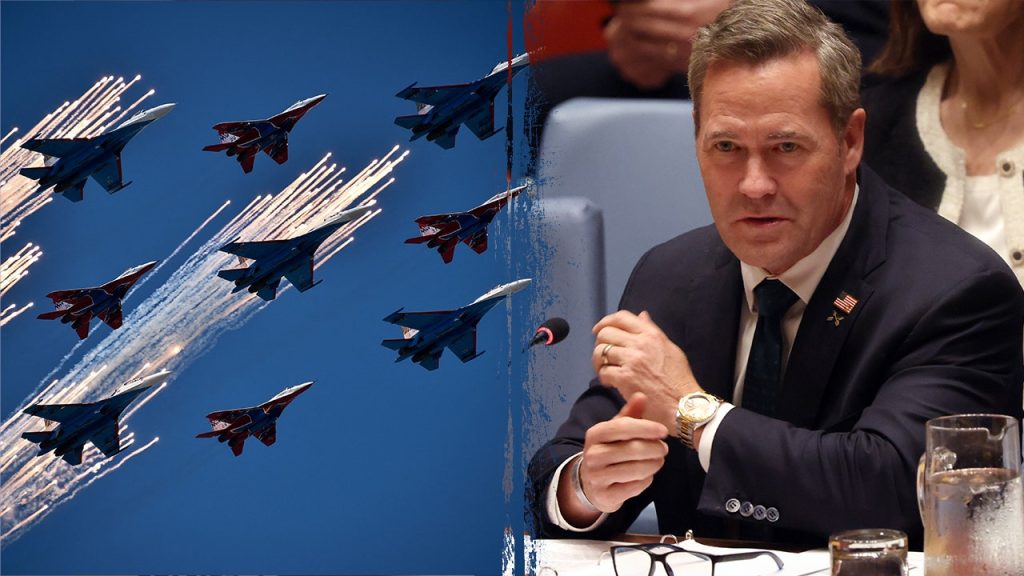U.S. Ambassador Warns Russia After NATO Airspace Violations
Firm U.S. Response to Russian Provocation
In his first major statement since being confirmed as the new U.S. Ambassador to the United Nations, Mike Waltz delivered a stern warning to Russia following its recent airspace violations over Estonia. “The United States stands by our NATO allies in the face of these airspace violations,” Waltz declared during his opening remarks at the United Nations General Assembly high-level week. With unmistakable clarity, he emphasized that “the United States and our allies will defend every inch of NATO territory,” calling on Russia to “urgently stop dangerous behavior.” This definitive stance comes at a critical moment, just days after three Russian MiG-31 fighter jets penetrated deep into Estonian airspace in what analysts describe as one of the most significant incursions in years. The incident has heightened concerns that Moscow may be deliberately testing NATO’s resolve and commitment to collective defense, particularly as the war in Ukraine continues to escalate regional tensions.
Details of the Escalating Provocations
The gravity of the situation became even more apparent when Estonia’s Foreign Minister Margus Tsahkna revealed that the Russian jets that violated Estonian airspace were armed and remained in their territory for a full 12 minutes. This incursion was not an isolated incident but part of a troubling pattern of Russian provocations against NATO member states. Just one week earlier, at least 19 Russian drones had entered Polish airspace, shortly after Polish President Karol Nawrocki met with President Donald Trump at the White House. Romania also reported finding a Russian-origin Shahed drone in its territory last week. These repeated violations have triggered serious concern among NATO allies about Russia’s intentions. The Estonian incursion was considered particularly brazen as it brought Russian military aircraft unusually close to Estonia’s Parliament building, representing not just a technical violation but what many perceive as a calculated message from Moscow.
NATO’s Article 5 and Collective Defense
The recent provocations have brought renewed attention to Article 5 of the NATO treaty, which stands as the cornerstone of the alliance’s collective security commitment. This critical provision states that an armed attack against one or more NATO members in Europe or North America is considered an attack against all member nations. In practical terms, this means that if any NATO country is attacked, all other member states are committed to take action in response. This principle of collective defense has underpinned European security for decades, but it now faces its most serious test since the Cold War. With Russian military assets violating the sovereign territory of multiple NATO members in rapid succession, the question of how the alliance responds becomes increasingly important. While no member has yet invoked Article 5 over these airspace violations, the repeated nature of these incursions has prompted emergency consultations and heightened military readiness across NATO’s eastern flank.
Russia’s Response and Rhetoric
Moscow’s reaction to these accusations has been dismissive and confrontational. Russia’s First Deputy Permanent Representative to the U.N., Dmitry Polyansky, called reports of the incursions “groundless accusations” and claimed there was “no proof except the Russophobic hysteria coming from Tallinn.” In a statement that revealed the deep ideological divide between Russia and Western democracies, Polyansky lamented that Europe was once “associated with the renaissance, enlightenment cutting edge of philosophy, culture and science,” but claimed that “today unfortunately all of that is gone and it’s gone for good.” He further alleged that the “only ideology” of European states is “primitive hatred” for Russia, and that “any events are immediately interpreted through an anti-Russian prism.” Most alarmingly, Polyansky accused Western nations of “frantically pounding into the heads of the European populace” the idea “that war with Russia is unavoidable” – rhetoric that seems designed to portray Russia as the victim rather than the aggressor in the current tensions.
Emergency U.N. Security Council Meeting
The seriousness with which NATO members view these violations was underscored by Estonia’s request for an emergency meeting of the U.N. Security Council, which was held on Monday. Estonian Foreign Minister Tsahkna used this international platform to condemn Russia’s actions in the strongest terms, stating: “Russia’s reckless actions represent not only a breach of international law, but also a destabilizing escalation that brings the entire region closer to conflict than at any time in recent years.” Tsahkna’s statement highlighted the paradoxical situation at the United Nations, where Russia remains a permanent member of the Security Council with veto power even as it continues its war against Ukraine and now escalates tensions with NATO member states. The Estonian minister characterized the Russian incursion as a “provocation” that is “profoundly disrespectful towards the collective and tireless efforts of the international community to bring an end to the Russia-Ukraine war and to restore peace and stability in accordance with international law.”
Ambassador Waltz’s New Role Amid Rising Tensions
Mike Waltz’s warning to Russia comes at the beginning of his tenure as U.S. Ambassador to the United Nations, a position he assumed after a narrow Senate confirmation vote of 47-43 last Friday. As a former House member from Florida who previously served as President Trump’s national security advisor until May, Waltz brings significant experience to this critical diplomatic post at a time of heightened global tensions. However, his confirmation process reflected the polarized nature of American politics, with a separate vote to confirm him as U.S. representative to the General Assembly not coming up for consideration – creating some uncertainty about aspects of his participation at the UN General Assembly. Nevertheless, Waltz’s forceful debut statement signals that despite changes in personnel, the United States remains steadfast in its commitment to NATO’s collective defense principles. His warning that the U.S. and its allies “will defend every inch of NATO territory” serves as a clear message to Moscow that regardless of political transitions in Washington, America’s commitment to European security remains unwavering in the face of Russian provocations.













